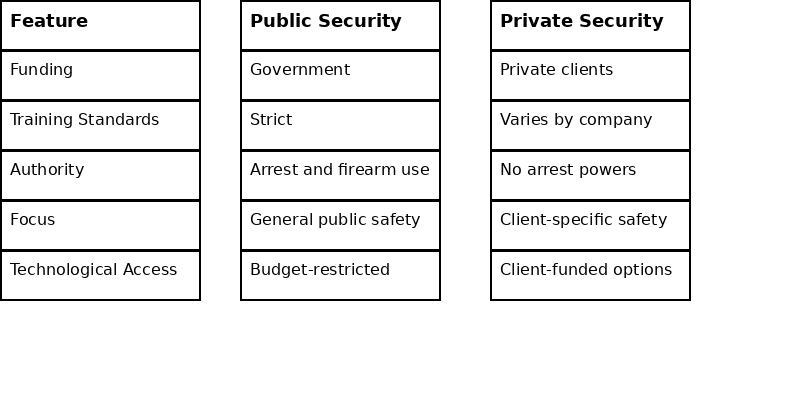
Public and private security play vital roles in safeguarding individuals, businesses, and properties. While they share a common goal of maintaining safety and order, their distinctions can significantly impact your security choices. Let’s explore the key differences and benefits of each to help you make the best decision for your needs.
Article Summary
- Public Security: Government-funded and focused on public safety, with law enforcement powers such as arrest and firearm usage.
- Private Security: Privately funded and client-specific, offering tailored services but lacking arrest authority.
- Flexibility: Private security is more adaptable to specific business needs, while public security ensures law enforcement and public safety.
- Choosing the Right Fit: Your decision should align with your specific security requirements, risks, and preferences.
What Is Public Security?
Public security refers to government-backed services such as police, detectives, and federal officers, aimed at ensuring public safety. These professionals are:
- Legally Empowered: Public security officials can make arrests, carry firearms, and use necessary force under specific legal frameworks.
- Resource-Constrained: Operate within government budgets and policies, potentially limiting access to advanced technology.
- Safety-Oriented: Prioritize the broader welfare of communities over individual needs.
This system focuses on enforcing laws and maintaining order, often enhancing public trust through visible presence and adherence to strict operational protocols.
Pros of Public Security
- Extensive Training: Public officers undergo advanced training and certification to handle diverse situations.
- Law Enforcement Powers: Authorized to arrest, carry firearms, and use force when necessary.
- Increased Public Trust: Their presence often reassures the community and deters criminal activities—extensive training and certification standards.
- Authority to arrest, carry firearms, and use force when necessary.
- Improves the general perception of safety.
Cons of Public Security
- Restricted by government budgets and policies.
- Limited focus on individual or business-specific needs.
- They may lack access to advanced technologies like surveillance systems.
What Is Private Security?
Private security refers to specialized services tailored to meet the unique requirements of businesses, individuals, or events. These services are funded privately rather than by government resources, allowing for flexibility and customization. Key aspects include:
- Personalized Protection: Focused on specific tasks, such as property patrols, event security, or personal safety.
- Adaptable Standards: Private firms can adjust protocols and strategies to match client needs without governmental restrictions.
- Advanced Technology Integration: Access to cutting-edge tools like AI-driven surveillance and real-time monitoring systems.
This approach ensures that clients receive dedicated support, enhancing both safety and peace of mind while aligning closely with individual goals and expectations. security is tailored to the needs of specific clients and funded by individuals or businesses. Services include:
- Guard Patrols: Focused on personalized security tasks.
- Flexible Standards: Operates outside governmental regulations, adhering instead to client expectations.
- Custom Solutions: Tailored security strategies designed for specific environments.
Pros of Private Security
- Provides customized services to meet unique client needs.
- Focused entirely on protecting client interests.
- High-quality firms hire guards with military or law enforcement backgrounds and rigorous training.
Cons of Private Security
- No standardized governmental training requirements.
- Inexperienced guards can pose legal and security risks.
Public vs. Private Security: Key Differences
Understanding the core distinctions between public and private security is essential for choosing the right solution. Public security prioritizes community safety through government funding and enforcement authority, while private security offers personalized, flexible protection tailored to specific client needs.

Table: Key Differences Between Public and Private Security
Which Security Option Is Best for Your Business?
When deciding between public and private security, consider:
- Business Needs: Private security provides tailored solutions, while public security focuses on general public welfare.
- Risk Level: High-risk businesses may benefit from public law enforcement’s authority.
- Customization: Private security offers flexibility and personalized strategies.
Making the Right Choice
Choosing the right security option involves careful research and evaluation of your needs. For businesses seeking specialized protection, private security often offers the best combination of flexibility, expertise, and customization. However, public security may be preferable for environments requiring authoritative enforcement.
Why Choose Us?
- Expertly Trained Guards: With backgrounds in law enforcement and military.
- Customized Security Plans: Designed to address your unique challenges.
- Commitment to Excellence: Ensuring top-notch security and client satisfaction.
Frequently Asked Questions (FAQs)
1. What are the emerging trends in private security?
Trends include the use of AI-powered surveillance systems, real-time analytics, and wearable technology for enhanced guard performance.
2. How is technology improving public security?
Advancements such as body cameras, drones, and centralized monitoring systems are helping public security agencies respond faster and more efficiently.
3. Can private and public security work together?
Yes, collaborations between private and public security often enhance overall safety by leveraging their respective strengths.
4. How does voice search optimization affect security services?
Companies adopting voice-friendly content are seeing increased engagement, as users frequently ask detailed, question-based queries about security solutions.



